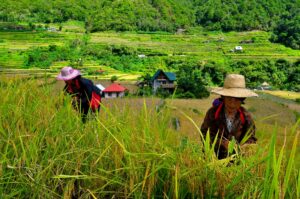By Patti Petesch, Eleanor Fisher, Jon Hellin and Chona Echavez

Our social world appears to spin in ways that reinforce social inequities and environmental degradation. These dispiriting forces are the case in so many of the world’s smallholder communities, discouraging countless local women’s and men’s initiatives to reduce the vulnerability of their agricultural livelihoods and exposure to severe heatwaves, droughts, storms and other impacts of climate change.
Can action research guided by social equity goals contribute to reversing these disempowering and unsustainable forces? Are there opportunities for communities to take positive action to equitably strengthen adaptation to climate change?
Locally led adaptation (LLA) programs are striving to strengthen resilience and adaptation capacity in climate hotspots around the world. Yet, one review concluded that evidence for strong community-driven dynamics could be found for only six percent of 374 LLA projects screened (Tye, S. & Suarez, I. (2021). Locally Led Climate Adaptation: What Is Needed to Accelerate Action and Support? Working Paper. World Resources Institute, Washington, DC.)
Without strong local leadership and broad-based participation informing and shaping these initiatives as they unfold, LLA approaches risk elite capture and further disadvantaging these communities’ women and subordinate categories of men (such as due to their young age or lack of resources). The limited evidence base about social and institutional dimensions of LLA initiatives also greatly limits what we can learn from these experiences.
Our Handbook, Emboldening equitable climate adaptation, contributes to closing this knowledge gap by elaborating a participatory learning model for smallholder communities that is centered on expanding gender and social equity as fundamental to strengthening adaptation capacity. The methods are designed to amplify the perspectives, experiences, and priorities of diverse local people. While concern for the most vulnerable remains paramount, the approach casts a wide net, encompassing diverse communities and participants who can contribute to and take forward adaptation initiatives that they perceive to be equitable and sustainable.
The Handbook is framed by five interlocking action learning strategies:

- Action learning strategy 1 rests on theorizing how gender and social equity grows. We draw from our field testing to illustrate how this theory provides a potent framework for orienting action learning about equity.
- Action learning strategy 2 addresses mobilizing partnerships for transformative learning at multiple levels. The diversity of partnerships and knowledge at different levels is vital to propelling, enriching, and sustaining action learning that nurtures equitable adaptation.
- Action learning strategy 3 delves into the complexities of facilitating locally led learning, with a focus on the field methods and the facilitation team.
- Action learning strategy 4 zeros in on analytic tactics for developing deep and wide insights that are relevant and impactful at the multiple levels of the learning partnerships.
- Action learning strategy 5 is about bolstering accountability to equity and squarely addresses the ongoing pressures of elite capture and other implementation struggles facing LLA programs. Building on existing research showing a need for multiple top-down and bottom-up accountability mechanisms to keep community-driven approaches on track with their objectives, we propose the piloting of an Equity Learning Collaborative (ELC).
The five strategies work synergistically to strengthen understanding of and support for gender and social equity through learning processes that are locally led, highly inclusionary, and effectively supported by external partners.
The learning methods have been tested in smallholder communities of Kenya and the Philippines; and the conceptual approach and methods, illustrated with selected findings, are presented in our journal paper, A field methodology to advance social equity and transformative adaptation to climate change.
The Handbook covers many but certainly not all the devilish details behind applying the five strategies. We review, for instance, the enhanced comparative and in-depth learning opportunities afforded by our sampling protocols that call for i) communities with diverse adaptation capacities and levels of wellbeing (and poverty), and ii) study participants who represent diverse categories of women and men in their community.
Most LLA initiatives, moreover, fail to document the learning, constraining what can be learned and cross-checked in the wake of a focus group or in-depth individual interview. The Handbook elaborates notetaking protocols among many other “must-do’s” that contribute to inclusive, rigorous, and compelling learning dynamics. In the final supplementary material, moreover, readers will find a list of additional resources to support their own LLA initiatives.
Despite strong partnerships, facilitation teams, and preparations, however, locally-driven approaches are inherently unpredictable and risk elite capture and missing, or perhaps even harming, a community’s most vulnerable members. In recognition of these common power dynamics, and the complexity of norms that sustain them, we argue in the final strategy for piloting an ELC and action learning methods that explore how backlash can be a potentially galvanizing force that informs a new wave of learning. Through this iterative action learning and multi-level partnering, a type of social change potentially can be sparked that stimulates a whole new set of normative expectations and institutional rules that are deeply empowering for a community’s women and many subordinate categories of men to identify and test actions that can improve their wellbeing and adaptation capacity.
Our Handbook is part of a blossoming of participatory learning models working to nurture transformative social change that strengthens gender and social equity, adaptation capacity, and sustainability. We are using the Handbook in our ongoing locally-led climate adaptation research supported by the CGIAR Climate Action and Scaling for Impact Programs, and the Australian Center for International Agricultural Research (ACIAR). The needs are urgent, but medium-to-long-term horizons are required for this action learning.
Patti Petesch is an independent researcher with expertise in gender, empowerment, poverty dynamics, social equity, and qualitative field research.
Eleanor Fisher is Head of Research at the Nordic Africa Institute (NAI) in Sweden.
Jon Hellin is a Climate Scientist at the International Rice Research Institute (IRRI).
Chona Echavez is the Director of the Research Institute for Mindanao Culture (RIMCU) of Xavier University.
+ + + + +
Download the handbook in pdf format:
Emboldening Equitable Climate Adaptation: A Handbook for Field Research Leaders
Petesch, P., Fisher, E., Hellin, J. & Echavez, C. (2025)
International Rice Research Institute (IRRI), Los Baños, Philippines
https://hdl.handle.net/10568/176578






